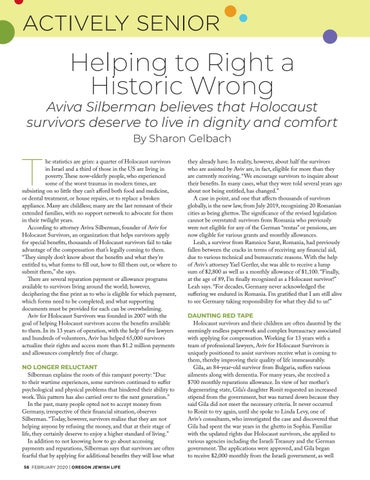ACTIVELY SENIOR
Helping to Right a Historic Wrong
Aviva Silberman believes that Holocaust survivors deserve to live in dignity and comfort By Sharon Gelbach
T
he statistics are grim: a quarter of Holocaust survivors in Israel and a third of those in the US are living in poverty. These now-elderly people, who experienced some of the worst traumas in modern times, are subsisting on so little they can’t afford both food and medicine, or dental treatment, or house repairs, or to replace a broken appliance. Many are childless; many are the last remnant of their extended families, with no support network to advocate for them in their twilight years. According to attorney Aviva Silberman, founder of Aviv for Holocaust Survivors, an organization that helps survivors apply for special benefits, thousands of Holocaust survivors fail to take advantage of the compensation that’s legally coming to them. “They simply don’t know about the benefits and what they’re entitled to, what forms to fill out, how to fill them out, or where to submit them,” she says. There are several reparation payment or allowance programs available to survivors living around the world; however, deciphering the fine print as to who is eligible for which payment, which forms need to be completed; and what supporting documents must be provided for each can be overwhelming. Aviv for Holocaust Survivors was founded in 2007 with the goal of helping Holocaust survivors access the benefits available to them. In its 13 years of operation, with the help of five lawyers and hundreds of volunteers, Aviv has helped 65,000 survivors actualize their rights and access more than $1.2 million payments and allowances completely free of charge. NO LONGER RELUCTANT Silberman explains the roots of this rampant poverty: “Due to their wartime experiences, some survivors continued to suffer psychological and physical problems that hindered their ability to work. This pattern has also carried over to the next generation.” In the past, many people opted not to accept money from Germany, irrespective of their financial situation, observes Silberman. “Today, however, survivors realize that they are not helping anyone by refusing the money, and that at their stage of life, they certainly deserve to enjoy a higher standard of living.” In addition to not knowing how to go about accessing payments and reparations, Silberman says that survivors are often fearful that by applying for additional benefits they will lose what 56 FEBRUARY 2020 | OREGON JEWISH LIFE
they already have. In reality, however, about half the survivors who are assisted by Aviv are, in fact, eligible for more than they are currently receiving. “We encourage survivors to inquire about their benefits. In many cases, what they were told several years ago about not being entitled, has changed.” A case in point, and one that affects thousands of survivors globally, is the new law, from July 2019, recognizing 20 Romanian cities as being ghettos. The significance of the revised legislation cannot be overstated: survivors from Romania who previously were not eligible for any of the German “rentas” or pensions, are now eligible for various grants and monthly allowances. Leah, a survivor from Ramnicu Sarat, Romania, had previously fallen between the cracks in terms of receiving any financial aid, due to various technical and bureaucratic reasons. With the help of Aviv’s attorney Yael Gertler, she was able to receive a lump sum of $2,800 as well as a monthly allowance of $1,100. “Finally, at the age of 89, I’m finally recognized as a Holocaust survivor!” Leah says. “For decades, Germany never acknowledged the suffering we endured in Romania. I’m gratified that I am still alive to see Germany taking responsibility for what they did to us!” DAUNTING RED TAPE Holocaust survivors and their children are often daunted by the seemingly endless paperwork and complex bureaucracy associated with applying for compensation. Working for 13 years with a team of professional lawyers, Aviv for Holocaust Survivors is uniquely positioned to assist survivors receive what is coming to them, thereby improving their quality of life immeasurably. Gila, an 84-year-old survivor from Bulgaria, suffers various ailments along with dementia. For many years, she received a $700 monthly reparations allowance. In view of her mother’s degenerating state, Gila’s daughter Ronit requested an increased stipend from the government, but was turned down because they said Gila did not meet the necessary criteria. It never occurred to Ronit to try again, until she spoke to Linda Levy, one of Aviv’s consultants, who investigated the case and discovered that Gila had spent the war years in the ghetto in Sophia. Familiar with the updated rights due Holocaust survivors, she applied to various agencies including the Israeli Treasury and the German government. The applications were approved, and Gila began to receive $2,000 monthly from the Israeli government, as well
